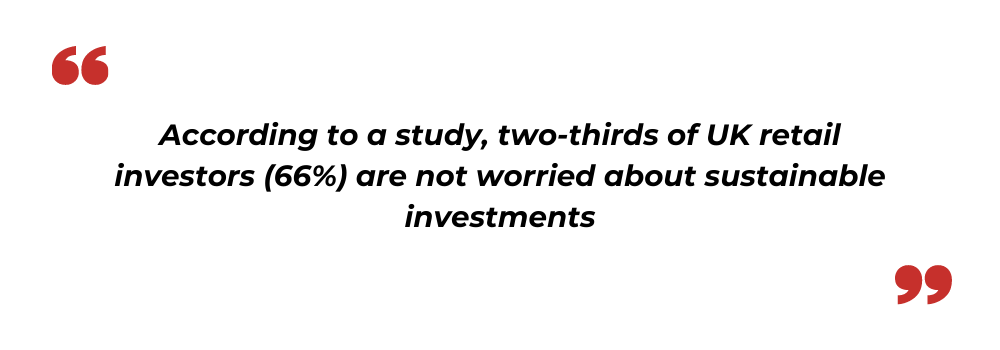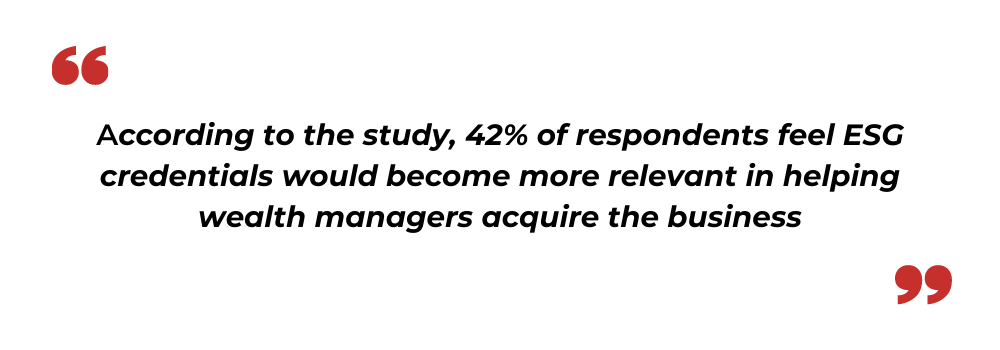Considerations around environmental and social factors still do not play a huge role in influencing the money decisions of retail investors as it is not too exclusive.
ESG - Environmental, Social, and Governance
Environmental, Social, and Governance (ESG) is a phrase that encompasses several problems that are used to assess how a company interacts with nature and the environment. Many investors are scrutinising and prioritising these elements as part of their financial research process, since they may be both dangers and opportunities and are increasingly recognised as critical to a company's long-term economic performance.

ESG investing is crucial for private equity companies and enterprises to ensure that sustainability activities are profitable and contribute to faster development. Emerging views about ESG investment and ESG portfolio, like other recent developments impacting retail investing, tend to be influenced in large part by younger generations and other investors. The knowledge of how investors regard ESG investing will undoubtedly alter. It will change accordingly as the investing community make people aware and increases to include more diverse and younger Americans.
What does ESG investment mean?
Enhance valuation, reduce investment risk, and safeguard reputation. ESG portfolio criteria are used by bold thinkers to generate value. This is done by:
• obtaining funding during fundraising
• lowering investment risk during due diligence
• capitalising on post-acquisition possibilities
• enabling all the information disclosure upon exit
When it comes to sustainable investment, find out more about the problems being faced -

What’s stopping Retails Investors from ESG investment –
According to study, two-thirds (Trustnet) of UK retail investors (66%) are not worried about sustainable investments. There are also generational differences, such as a significant divide between the mentality of older and younger investors. Surveys suggest that middle-aged investors don't care about what's good for the environment; they only think about making money. Many investors may be hesitant to make investments because they think this would incur an extra greater expense. Around 70% of investors feel that sustainable investing alternatives are more expensive, yet 58 percent would be ready to pay higher fees for them.
1. Many retail investors are still not aware of the concept of ESG investing
ESG stands for environmental, social and governance. It's a term used to describe how a company is run with regards to environment. While more and more institutional investors are taking ESG into consideration when making investment decisions, many retail investors are still unaware of the concept. Many investors feel that investing may be a tool to influence change and that ESG investing can provide results equivalent to non-ESG investments; therefore, lack of understanding appears to be the biggest obstacle to ESG investing.
2. Retail investors tend to be more short-term in their thinking
Many retail investors are focused on the short-term goal of making a profit from their investments. They may not be as concerned with the long-term impact of a company's ESG performance on society and the environment.
3. There is a lack of easily accessible ESG data for retail investors
For retail investors to make informed investment decisions, they need access to reliable and up to date ESG data. However, most of the data is often difficult to find ad sometimes is not readily available in a format that is easy to understand.
4. Because it is not mandatory
Unlike other industries like manufacturing and more, the retail sector is not bound to disclose their ESG practices. This lack of transparency makes it difficult for investors to make informed decisions and make themselves prepare where to invest their money.
5. Investors feel it is an extra expense
Investors frequently seek for firms that contribute to environmental improvements, such as renewable energy providers. However, there is a tendency to forego investment success in exchange for greater costs. Another obstacle was the impression that sustainable investments were more expensive than others.
6. Retailers find it difficult to measure
There is no one-size-fits-all approach to measuring ESG performance. For major companies, it is challenging for the investors to compare companies. Those who say they have ESG investments often feel they will perform as well as or better than the rest of the market. ESG investors' investing expertise levels are not different from that of regular retail investors.
7. Disclosure is voluntary which retailers avoid
Some companies choose not to disclose their ESG practices, which makes it difficult for investors to know which companies are trying to be more sustainable. While all investors care about their assets' financial success, ESG investors are often driven by environmental concerns. According to recent study, more than half of UK investors are unconcerned about whether their investments are long-term. Despite the growing popularity of sustainable investing, the surveys shows that ESG is still not a top priority for many retail investors.
Read more – New energy transition trend to check out for more reference.
ESG management is becoming a business need.
ESG is increasingly widely used in boardrooms as a helpful aggregate description for a variety of issues relating to how a company interacts with society and the environment. Even though ESG is now widely used in business, investment and finance access continue to drive and define the kind of activities implemented.
Actions are necessary to demonstrate that ESG risks and opportunities are addressed, from pension fund managers seeking new mandates to asset managers assisting in the allocation of that money to public or private firms presenting investment possibilities. ESG aspects, as both risks and opportunities, are widely recognised as critical to long-term commercial success. Management of Environmental Social Governance has become a corporate need.
Environmental issues are a factor in motivating many ESG investors.
In general, retail investors consider environmental factors to be the least significant. They do not feel it as important as it is social, governance and financial considerations when making investment decisions. When we compared, we see that both groups, ESG investors to non-ESG investors, give more interest and the highest importance to financial aspects. The stats might alter in the next two years, according to the study, since 42% (Fintech Global) of respondents feel ESG credentials would become more relevant in helping wealth managers acquire the business.

ESG Major Concerns
When it comes to investing, investors have identified their ESG concerns, with climate change, workers' rights and conditions, and executive compensation topping the list.
Climate change, emissions, and pollution were among retail and institutional investors' top environmental worries, while workers' rights, fairness/equality, and diversity were among the top social issues. For institutional investors, governance issues included CEO (Chief Executive Officer) remuneration, board diversity, and board independence, but individual investors highlighted corruption.
Over half of the institutional investors expressed worry about climate change risks and stated they have actively seen the impact how carbon is handled in fund reporting. Additionally, individual investors such as financial advisers and discretionary fund managers said they are more inclined to search for information on climate change and risk exposure inside a portfolio. Climate change is the most expressed issue among retail and institutional investors, followed by carbon and emissions pollution. Investors are more aware of the relationship between how firms deal with environmental issues and opportunities and their financial success.
.jpg)
Summary
While investor engagement in sustainable investing is modest, investors tend to connect their assets with their principles. With nearly more than half of the investors saying they would be willing to accept a lower return in exchange for a responsible or sustainable investment. Despite the widespread interest in sustainable development challenges, very few investments in these areas were recorded. Investor ignorance appears to be a substantial obstacle to investing in responsible or sustainable investment products, with over 75% claiming to be uninformed of various "responsible" or "sustainable" investment options.
Many organizations are considering environmental, social, and governance (ESG) standards as an important aspect of their businesses these days. ESG analysis has grown in importance as part of the investing process.
With presence in New York, San Francisco, Austin, Seattle, Toronto, London, Zurich, Pune, Bengaluru, and Hyderabad, SG Analytics, a pioneer in Research and Analytics, offers tailor-made services to enterprises worldwide. A leader in the ESG Consulting space, SG Analytics offers a unique combination of expertise and capabilities that enable organizations to meet their objectives.









